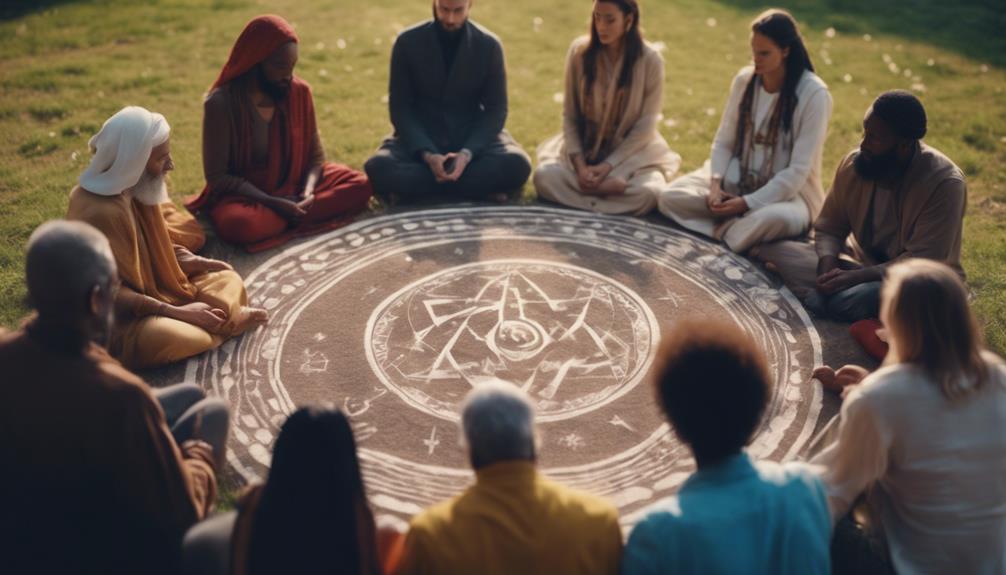In the contemporary milieu, where discord often overshadows harmony, the pursuit of spiritual unity emerges as a pivotal endeavor. Central to the Bahá’í teachings is the profound principle of oneness, a notion deeply embedded within the fabric of human existence and interwoven with the thread of peace. This exploration delves into the Bahá’í perspective on oneness and peace, elucidating the promises of spiritual enlightenment and the transformative shift in worldview that accompanies this profound journey.
At its core, the Bahá’í Faith posits that humanity is a single, interconnected entity—akin to a vast tapestry in which each individual’s thread contributes to the whole. This concept of oneness transcends mere ideology and calls for the realization of an inherent unity among diverse cultures, religions, and nationalities. The essence of this teaching resonates in the assertion that the varied expressions of faith throughout history are but different reflections of the same divine truth.
The Bahá’í writings articulate that spiritual unity is not merely an abstract ideal; it is a tangible reality awaiting recognition. This recognition catalyzes a shift in perspective, unlocking the potential for each individual to embrace a broader understanding of their place within the cosmic order. With the acknowledgment of oneness, the individual is invited to transcend personal biases and prejudices, thereby paving the way for a more harmonious existence.
Furthermore, the Bahá’í teachings emphasize the significance of collective transformation. The vision of peace that emerges from the recognition of oneness is not solely predicated on individual enlightenment but rather on communal sanctity. Each individual’s spiritual journey is intertwined with the journeys of others, illustrating the interdependence that characterizes our shared reality. This interconnectedness fosters compassion and understanding, nurturing environments where tolerance flourishes and conflict diminishes.
In the quest for spiritual unity, the Bahá’í perspective posits that love is the cornerstone of all relationships. It is through love that individuals can cultivate deeper connections, bridging the chasms that often divide. The emphasis on affection extends beyond familial ties, prompting individuals to engage in selfless service to humanity. The potent force of love, when manifested through action, fosters an atmosphere ripe for peace and reconciliation.
Nevertheless, achieving such unity is not devoid of challenges. The world is rife with cultural divides and historical grievances that act as formidable barriers to understanding. However, the Bahá’í teachings provide a beacon of hope, highlighting the need for dialogue and active engagement as a means of dismantling these barriers. Encouraging open conversations can pave the way for empathy and foster a genuine appreciation for the diverse experiences that shape our collective humanity.
Moreover, the concept of oneness in the Bahá’í context extends to the ecological realm. Humanity’s relationship with the natural world is intrinsically linked to the spiritual principle of unity. The degradation of the environment reflects a disconnection not only from the Earth but from each other. Recognizing the interconnectedness of all existence implores us to act with responsibility and stewardship towards the planet. A spiritually unified perspective fosters holistic approaches to ecological issues, promoting sustainable practices that honor the sanctity of life.
In navigating the complexities of our modern existence, the pursuit of peace necessitates a paradigmatic shift. The Bahá’í teachings advocate for the establishment of a global civilization built upon the principles of justice and equity. This envisioned society entails dismantling the systemic injustices that perpetuate division and strife. By fostering an understanding that the well-being of one is intertwined with the well-being of all, the Bahá’í principles encourage individuals to work collaboratively for the greater good.
The Bahá’í Faith further emphasizes the power of education as a transformative tool in the quest for unity. Education, when infused with the ideals of oneness and peace, cultivates a generation of individuals equipped to challenge prevailing narratives of conflict. By fostering critical thought and embracing diverse perspectives, education serves not merely as a conduit for knowledge, but as a catalyst for social change. The infusion of spiritual principles within educational frameworks can inspire future leaders to champion the cause of global unity and peace.
The spiritual journey towards oneness and peace is imbued with a sense of urgency. In a world that often prioritizes materialistic pursuits, the Bahá’í teachings advocate for a reorientation towards spiritual values. This realignment promises a profound shift in perspective, transcending superficial distinctions and engendering a deeper appreciation for our shared humanity. The realization of spiritual unity invites individuals to partake in a collective awakening, whereby peace becomes not an aspiration but a lived reality.
In conclusion, the exploration of oneness and peace within the framework of Bahá’í teachings serves as a profound invitation to embark on a transformative journey. As humanity grapples with the challenges of the modern era, the principles of unity can serve as a compass guiding individuals towards spiritual enlightenment and communal resilience. Through love, dialogue, education, and a commitment to justice, the promise of spiritual unity becomes attainable—a testament to the inherent interconnectedness of all life and the boundless potential for peace that resides within each of us.
